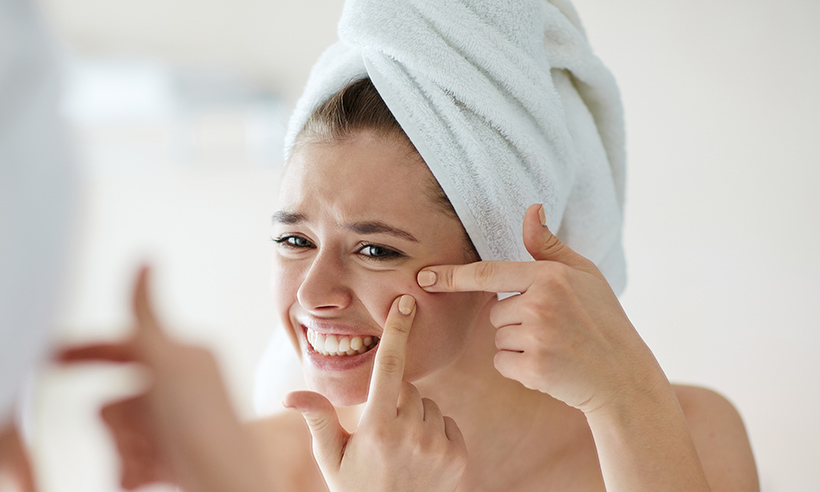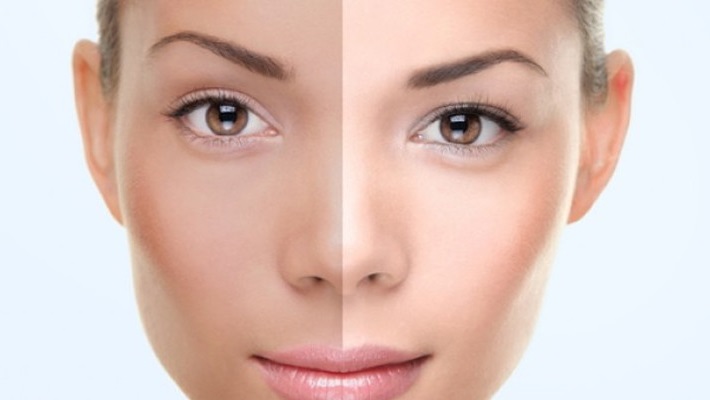1) What role does gene play in determining the quality of skin?
Ans) As with all of our other organs, our skin quality, tone, function and rate of aging is determined not only by external factors such as diet, stress, and pollution, but also by genetic factors. Surely, many of us have come across women and men with flawless skin, though they do almost nothing to take care of the skin, and some, who despite taking obsessive care of their skin never achieve their dream of a good skin.
The tendency to have pimples, pimple scars, pigmentation, sensitive skin, skin aging andcancers is largely determined by genetics.
Fair/red haired- blue eyed individuals like Europeans will have more “problematic”, damage prone skin compared to darker complexioned, brown eyed Indians and Asians.
Europeans age rapidly compared toAsians and are readily damaged by the sun causing problems like freckles,skin cancers etc. On the other hand, Indian skin tends to scar and pigment easily. Even amongst Asians, the Japanese and Koreans have better skin quality in terms of tone, texture and health as compared to most Indians.
For Original Document, Click on the below PDF
2) People often say that problems like acne, blemishes, pigmentation are due to genetic make up. Is it true?
Ans) There are multiple factors which are responsible for these problems, Bad genetics makes one more prone to develop these problems.
Genetics is thought to be the cause in 80% of cases of acne. Having a first-degree relative with acne increases your risk of getting it by 4 times. For example, if there is a history of Acne in both parents, the children have a high chance of developing acne , more so if they have a bad diet, sedentary lifestyle and stressful environment to add to the issue. Studies have shown that identical twins have much higher chances of developing acne that in fraternal twins.
Similarly, in cases where there is a family history of melasma( a common pigmentary disorder in women of the around menopausal age group), the chances of the children developing the problem are very high.
Vitiligo, or white patches on the skin, have a strong genetic predisposition.
For Original Document, Click on the below PDF
3) Not everyone is blessed with genetically good skin. Can she achieve a good skin by proper lifestyle modification?
Ans) Your skin will go with you till your grave, so treasure it!
Everyone can have great looking skin. One needs to work at it.
Diet, exercise, lifestyle and the skin care regimen followed determine to a great extent how your skin looks.
1) Eat a balanced diet rich in proteins and antioxidants. Include lots of fruits , vegetables and water in your diet, cut down on spicy, sweet and oily food.
2) Exercise regularly, it is a myth that thin people do not need exercise.It boosts immunity, increase blood supply to the skin and helps balance hormones in the body.
3) There are some factors which you may not be able to control, as in, pollution levels in the environment, stress at work, irregular sleeping and eating hours etc. So, in general, try to do your best, de stress once a while, and stay positive.
4) There are so many skin care products available in the market which add to the confusion of the customer. Follow a simple routine of cleansing , toning and moisturizing, and sunscreen use daily. If you are not sure of what products you must use, it makes sense to consult a good skin care physician, since this is something you will be following for life, so it better come from an expert!
5) Do not self treat your skin and try remedies from hearsay, even GOOGLE for that matter does not substitute for a practical expert opinion.
For Original Document, Click on the below PDF
4) Does choosing a wrong cosmetic can cause problems for your skin? How should one choose the right cosmetic?
Ans) Cosmetics can create magic, only if used correctly.
1) Know your skin type, there is a huge difference between products meant fordry skin , oily skin, or combination skin types.
2) Do not compromise due to the cost.Choose products which provide enough information and have been tried and tested before and after they are launched in the market.The brand does matter in terms of safety and accountability.
3) You are not going to change cosmetics everyday, they are meant for long term use on the skin, so invest in the right kind to begin with.It will be an investment worth it.
4) Do not assume that all expensive products are good, and that a product endorsed by a particular celebrity is bound to be good. All skin and hair cosmetics must be tried first on a small part of the skin, generally the neck or the back of the ears, if there is no irritation, or reaction. it will be safe to use it on the face as well.
5) Products for sensitive skin need to be selected carefully.Consult a skin care expert physician before zeroing in on one.
6) Never go to bed with make up on, it can play havoc with the skin and can cause untoward allergies and damage.Use a good cleanser to remove make up followed by washing with your regular face wash.
7) The above rules apply for makeup products used for the lips and the eyes as well.
For Original Document, Click on the below PDF
5) What kind of care should be taken for problems like blemish, pigmentation and premature wrinkle?
Ans) In addition to the lifestyle modifications as mentioned above,
a) Follow sunprotectionand use good sunscreen
b) Avoid excessive use of cosmetics and perfumes
c) Avoid scrubbing and bleaching the skin too often.
d) Following the right basic skin care regimen of appropriate cleanser, toner and moisturizer.
e) After 30 years of age, start usinganti aging products which contain peptides, retinoidsand/or hyaluronic acid. These help to renew skin, and hydrate it so as to delay wrinkling and aging.
f) Oral supplements containing antioxidants like cod liver oil, collagen, green tea, kale, nuts, red wine help boost skin immunity.
g) Consult for appropriate medical treatment if the problems are not sorting out .There is technology and expertise available now like never before. Some of the treatments like microdermabrasion or skin polishing and chemical peels help to gently exfoliate the skin and help if there are minor skin problems like pigmentation and blemishes. They are also useful as maintainence therapy to prevent aging and for a glowing skin.
h) Procedures like botox injections, fillers and thread lifts are available for those who have already developed the lines and wrinkles and would like them to be treated.
i) Lasers and other non surgical skin tightening devices have revolutionized the world of skin rejuvenation and give amazing results if done appropriately.
j) Parlour treatments like clean ups for those who have blackheads, and facials for maintaining skin health give a sense of well being as well as pampering to the skin to soothe it and look good.
k) If you have a sensitive skin, you must consult a skin care specialist to give you avise on the right kind of products for your skin.
For Original Document, Click on the below PDF
6) Can the possiblity of skin cancer be in your genetic make up? If someone carries those possibility, what should be the precautions like?
Ans) Some skin cancers like the melanoma have a strong correlation with genetics so much so that if there is a family history of this disease, regular screening of the family members is mandatory.
Some others like SCC and BCC are related to your skin type which is invariably related to your genetic make up.
Precautions include:
1) Regular dermatological check up if there is a family history.
2) If you notice any moles on the skin which are behaving unusually, like rapidly increasing in size, bleeding, pain etc.seek professional help at the earliest.
3) Regular sunscreen use goes a long way in skin cancer prevention.
4) Avoid contact with hash chemicals , dyes to the skin.
For Original Document, Click on the below PDF
7) What is the role of diet in maintaining good skin?
Ans) People who eat healthy look healthy.
Diet for the skin:
1) Daily intake of fresh seasonal fruits and vegetables which are loaded with antioxidants.
2) No Processed foods and refined sugar like breads,sweets, deep fried stuff, precooked meals etc.
3) Low carbohydrate and low fat in the diet.
4) High protein content like chicken, fish, eggs, dals, sprouts.
5) Adequate water intake.
6) In general, the normal Indian food with daily traditional breakfast and small amounts of rice, chapattis, dals, vegetables, curd and white meat for lunch and dinner is the ideal food both in terms of health for the body as well as for the skin.









